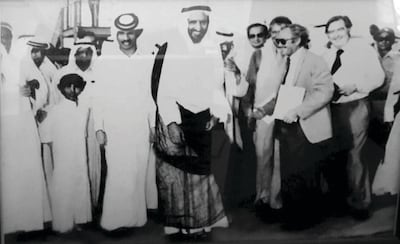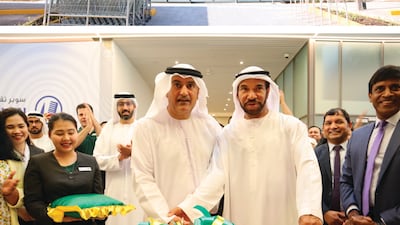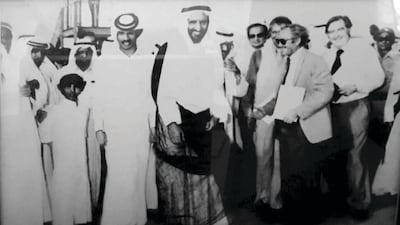Back in the roaring 1920s, a British army officer stationed in Alexandria decided he needed a change from military life.
Setting up operations in the suburbs of the Egyptian city, he first supplied provisions for railways in what was then the League of Nations mandate for Palestine.
Soon he had moved his headquarters to Haifa, then part of Palestine and one of the stops along the Palestine Railways that ran between 1920 and 1948. There he sold imported British goods ― considered a luxury at the time ― to customers as far away as Syria.
This included motor cars, with an advert in the Palestine Bulletin for October 13 , 1931 offering a “bargain” Austin 7 Saloon for sale.

Prospective buyers were invited to visit the shop on the Jaffa Road, named after this budding entrepreneur: Arthur Rawdon Spinney.
Spinneys supermarkets is just one of a number of instantly familiar retail names in the UAE. Jashanmal is another staple to the UAE. But the story of those two household names, the people behind them, and how they are woven into the history of the country, is perhaps not as well known.
Spinneys survived a bomb attack on its Jerusalem branch in 1936, and continued to expand across the Middle East, arriving in Baghdad, during the 1936-1939 Arab Revolt, and Beirut in 1948.
After the July 14 Revolution in Iraq in 1958, and the execution of King Faisal II, a decision was made to relocate the Baghdad outlet to Dubai.

The branch opened in 1962, in Al Nasr Square, with Sheikh Rashid bin Saeed, Ruler of Dubai, as the first customer. He bought a bottle of grenadine syrup.
Locally, it became known as “The Frozen Chicken” because it was the only retailer to sell frozen poultry, using a chiller van.
Today, there are Spinneys supermarkets in Egypt, Jordan and Oman. In Lebanon, the brand is owned by Grey Mackenzie Retail, another trading name with deep roots in the region, and originally a shipping company founded in the 19th century. In Abu Dhabi, Grey Mackenzie still sells licensed beverages as part of Abu Dhabi Maritime and Mercantile International.
In the UAE, there are now more than 50 Spinneys supermarkets and convenience shops, with the brand name now owned by Albwardy Investments, which was founded by an Emirati businessman, Ali Albwardy.
As for Arthur Spinney, he retired in the 1960s, living in the English seaside town of Littlehampton until his death at the age of 83 in 1973.

Another familiar UAE brand very much retains its family connection. In 1919, a 24-year-old from Karachi, Rao Sahib Jashanmal, travelled to Basra in Iraq.
Like Pakistan and India, Basra was under British rule at the time, and seeing an opportunity to trade in the British Empire, he opened a store carrying the family name of Jashanmal, serving workers in the oil industry.
Oil was a major part of the Iraqi economy, and as discoveries were made in other countries in the Arabian Gulf, the Jashanmal family followed, taking advantage of this growing prosperity.
Led by Rao Sahib’s sons, Naraindas, Atma, Hiro and Mohan, Jashanmal stores could eventually be found Kuwait, Bahrain and Dubai, selling high quality products from books and watches to Clarks desert boots.Tony Jashanmal, Rao Sahib’s grandson, now heads the company.

When oil was discovered in Abu Dhabi in 1958, Jashanmal set up shop at the exploration base on Das Island supplying workers, and then, later, in Abu Dhabi.
Today the fourth generation of the family is entering the business, which employs more than 5,000 people at more than 100 shops.
A version of this article was first published on September 1, 2022










